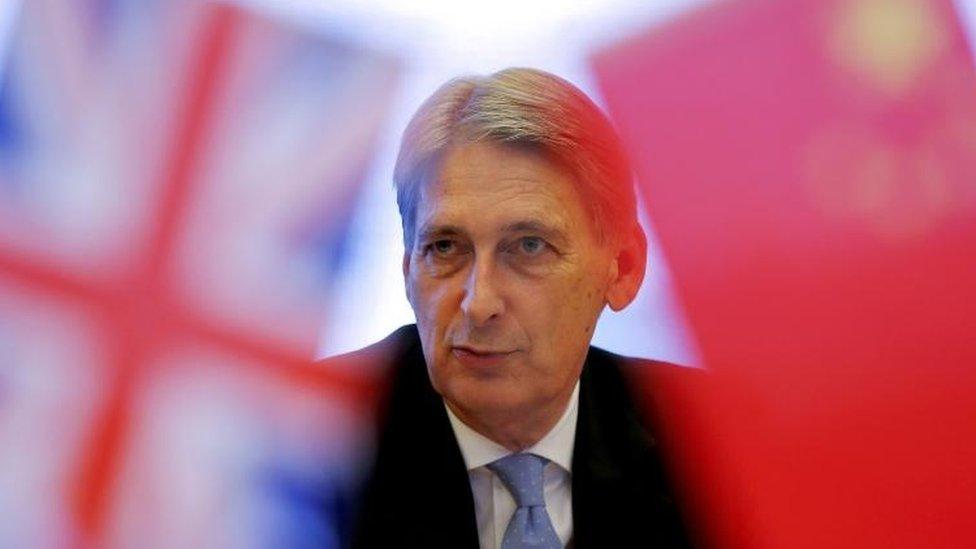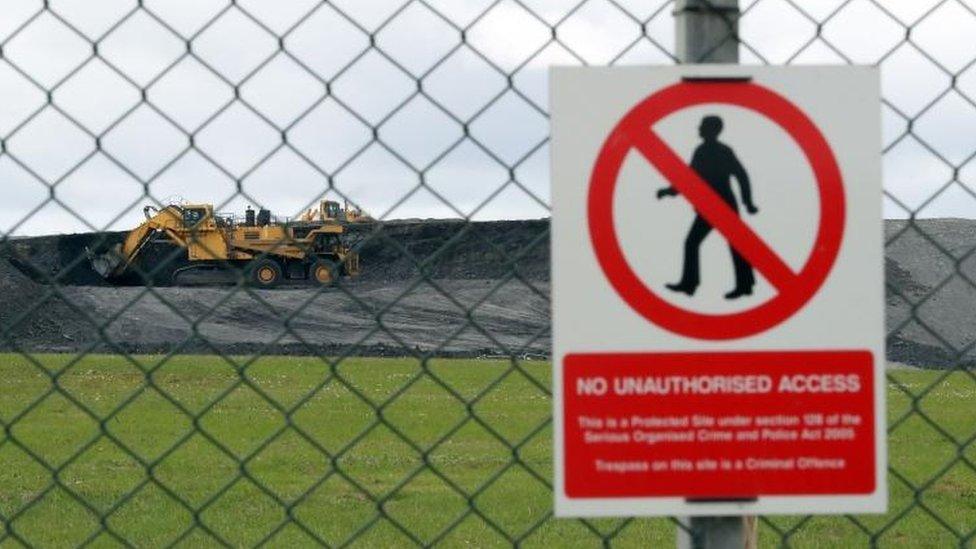Why did the chancellor tell me Hinkley 'will go ahead' five days ago?
- Published
- comments

When you are chancellor, you tend to know pretty much everything that is going on in government.
So the fact that Philip Hammond told me at the weekend that Hinkley "will go ahead" raises a whole host of possibilities, from the intriguing to the mundane.
For the sake of completeness, here is the full exchange between the chancellor and me when I interviewed him at the G20 summit in Chengdu, China, last Sunday.
Kamal Ahmed: "One of the big issues [in China/UK relations] is of course Hinkley. We could be very close to a final decision on that huge new nuclear power station in Somerset. Is the government still wholly committed to that plan despite the criticisms that it is far too expensive a way to provide energy for the UK?"
Philip Hammond: "The decision we are making about investing in new nuclear power infrastructure is a 50-year time horizon decision, this is not about looking at what prices are today. It is about thinking about our energy security needs over the next 50, 60 years. This decision is now in the hands of EDF, the French company which hopefully will be in a position to make a final investment decision over the next few days."
KA: "But the government still fully supports Hinkley?"
PH: "Yes, our hope is EDF will be able to come to a conclusion quickly and then we will be able to go ahead with this project."
Pretty definite.
So, what changed between that interview and the Hinkley "pause button" decision the government announced last night?
There are a number of options.
First, that whatever caused the government to pull on the hand brake and announce a further delay only became clear over the last few days.
That would suggest Number 10 concerns, rather than broader government worries, as issues often only reach the in-tray of the Prime Minister for final decision at the last moment.

Will Hinkley C be ready by 2025?
Second, that Hinkley will indeed go ahead but the connected nuclear projects at Sizewell in Suffolk and Bradwell in Essex will be reassessed.
Under the present agreement, China would be in charge of the Bradwell project, and Theresa May's adviser Nick Timothy has previously raised concerns about security and Chinese investment.
Third, that this has been a policy "Horlicks", with Number 10, the Treasury and the business department unaware of what the other was thinking.
Fourth, the whole three power station project will go ahead and the deal will be signed-off in the autumn, simply a few more weeks of bureaucratic delay for a project that, it was claimed a decade ago, would be providing electricity to cook our Christmas dinner by next year.
If Hinkley C is providing electricity by 2025, many people will be surprised.
UPDATE 11:50
It seems that Number 10 agreed the idea of a review of Hinkley Point C "in the last few days" - which is the reason why Mr Hammond sounded so bullish about the plans last Sunday.
Although I am told there were "various discussions" about how to handle the Final Investment Decision when it came from EDF, nothing was finalised until the last minute.
Some might say that is almost like being caught off guard by the arrival of Christmas.
But, reassurance is the word that is being used by my sources.
Not cancellation - not yet anyway.
Theresa May is a new Prime Minister who doesn't want this deal to come back and bite her on the backside in a decade's time.
If the project does suffer cost overruns or does prove an eye-wateringly expensive way of providing energy, Mrs May wants to be able to say she went through a thorough process.
And not be the Prime Minister accused of rushing such a significant decision early in her tenure.
It was always the view in government that a final decision wouldn't be necessary until the autumn.
Indeed, the French finance minister, Michel Sapin, told me earlier in the year that was the plan.
Number 10 didn't want to be bounced by EDF pulling the investment decision forward - it wanted to stick to its own timeline.
My sources say that at this stage we should not over-interpret the review.
Yes, it raises questions, but abandoning Hinkley would mean a major change in energy policy.
Interestingly, the government's use of the phrase "all the component parts" in the review announcement does suggest that the Sizewell and Bradwell projects could be "decoupled" from Hinkley - and reassessed.
What we have learnt over the past 48 hours is that government is often hectic and last minute.
Which is never a good look for the outside world.
And that in the end, Number 10 calls all the big shots.
Whatever the Treasury may think.
Roll on new airport runways...